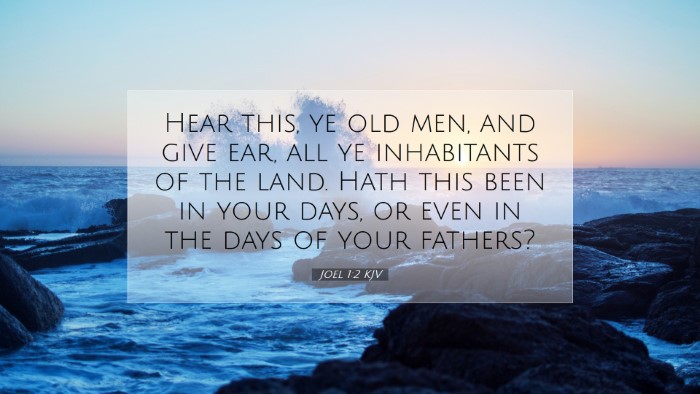Old Testament
Genesis Exodus Leviticus Numbers Deuteronomy Joshua Judges Ruth 1 Samuel 2 Samuel 1 Kings 2 Kings 1 Chronicles 2 Chronicles Ezra Nehemiah Esther Job Psalms Proverbs Ecclesiastes Song of Solomon Isaiah Jeremiah Lamentations Ezekiel Daniel Hosea Joel Amos Obadiah Jonah Micah Nahum Habakkuk Zephaniah Haggai Zechariah MalachiJoel 1:2
Joel 1:2 KJV
Hear this, ye old men, and give ear, all ye inhabitants of the land. Hath this been in your days, or even in the days of your fathers?
Joel 1:2 Bible Commentary
Commentary on Joel 1:2
Introduction: The Book of Joel is a crucial text that addresses the themes of judgment and restoration. In Joel 1:2, we find a call to attention regarding the momentous events that are about to unfold. This verse serves to set the tone for the prophetic messages that follow, emphasizing the seriousness of the occasion.
Text Analysis
Verse (Joel 1:2): “Hear this, ye old men, and give ear, all ye inhabitants of the land. Hath this been in your days, or even in the days of your fathers?”
Call to Attention
The verse begins with a profound call: “Hear this.” This invitation to listen is directed to the “old men” and “all ye inhabitants of the land.” Matthew Henry remarks that the elders are typically seen as the bearers of wisdom and experience. Thus, this call is not only for their attention but also for their actionable response. Henry emphasizes that the elders’ awareness of history is critical in recognizing the significance of current events.
Generational Reflection
Joel calls for a comparison between the present calamities and those of the past. The phrase “Hath this been in your days, or even in the days of your fathers?” invites a collective memory among the people. Albert Barnes points out that the prophet is urging the people to reflect on their history while considering the severity of the current situation. This reflective approach serves as a reminder of God’s dealings throughout generations.
The Nature of the Message
The nature of the calamity reveals God’s judgment—a divine act intended to call His people back into a right relationship with Him. Adam Clarke highlights the significance of awareness and the necessity to acknowledge God’s sovereignty in both judgment and restoration. Clarke's commentary suggests that recognizing such divine actions can lead to repentance and, ultimately, spiritual renewal.
Theological Implications
Joel 1:2 serves as more than just a historical account; it provides invaluable theological insights.
- Divine Sovereignty: The verse underscores God's control over human affairs and history.
- Call to Repentance: The prophetic call is a precursor to a spiritual awakening among the people.
- Community Responsibility: By addressing the leaders and the common people alike, it emphasizes collective responsibility for sin and the need for change.
- Continuity of God’s Message: The reference to the past encourages believers to understand the continuity of God's dealings with humanity, fostering deeper faith and trust in His promises.
Practical Application
The implications of Joel 1:2 extend beyond its historical context. Today's pastors and teachers can draw several practical applications from this verse:
- Encourage Active Listening: Just as Joel presents a call to hear, contemporary leaders should urge their congregations to actively listen to God's Word, recognizing its relevance in today’s context.
- Foster Intergenerational Dialogue: Encourage discussions between the younger and older generations in faith communities, allowing wisdom and experiences to shape understanding and growth.
- Promote Reflective Practices: Create spaces within congregations where members can reflect on their own lives in light of God's historical acts, fostering a deeper understanding of His faithfulness.
- Invoke Awareness of Current Events: Help congregations to draw parallels between the biblical narrative of judgment and the present-day situations they face, urging repentance and a return to God.
Conclusion
In summary, Joel 1:2 serves as a critical reminder of the importance of both historical awareness and spiritual responsiveness. By heeding this call, individuals and communities can better recognize the gravity of their circumstances and the urgency of God’s voice directing them towards repentance and renewal. The insights from Matthew Henry, Albert Barnes, and Adam Clarke collectively reinforce the significance of this verse as both a warning and a promise of divine restoration.


